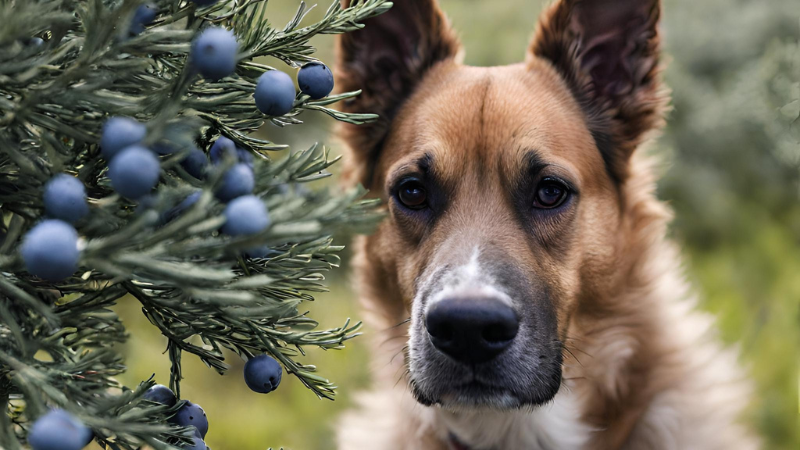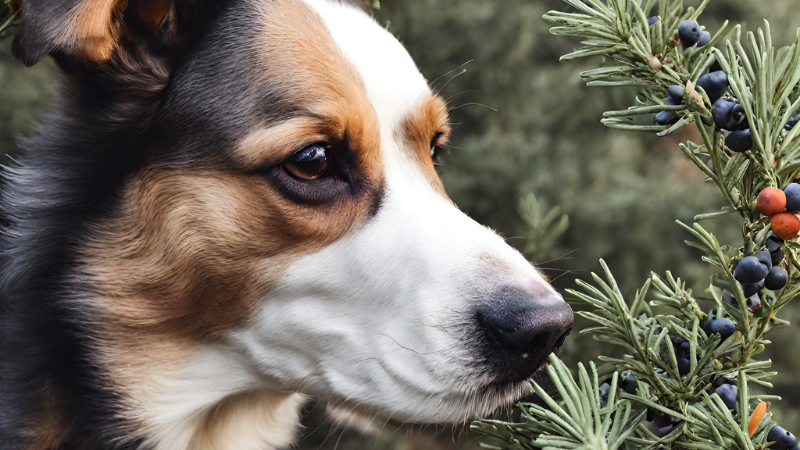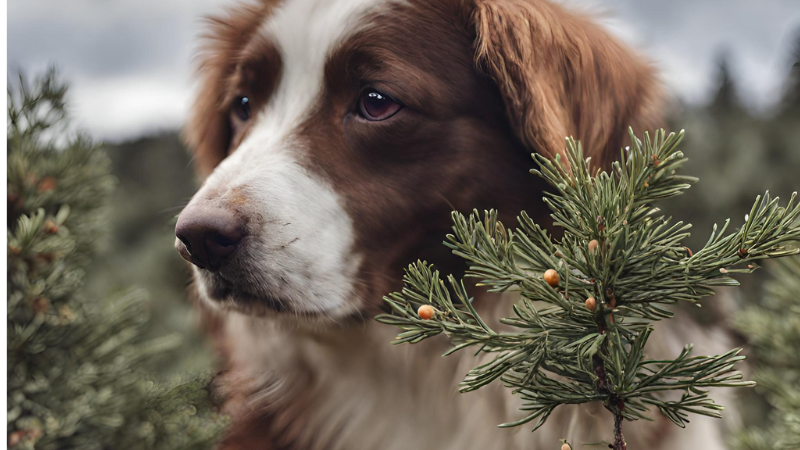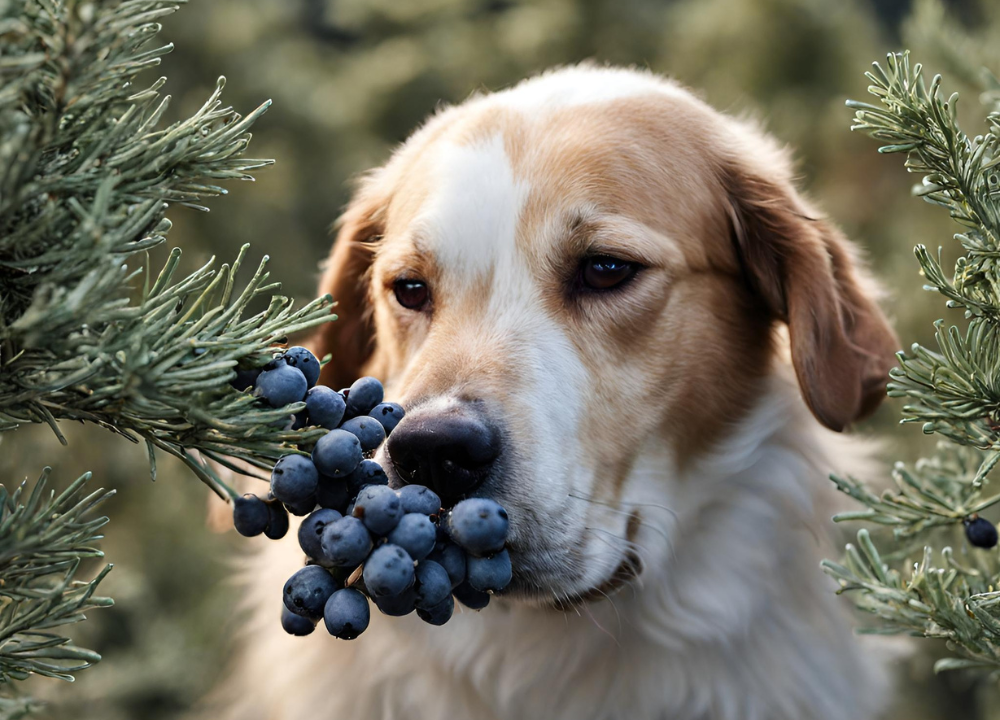Juniper berries are toxic to dogs and can cause gastrointestinal upset and kidney damage. These small, blue berries are commonly found on Juniperus plants and should be kept out of reach of pets to ensure their safety.
Juniper berries contain essential oils, such as terpenes and flavonoids, which can be harmful to dogs when ingested. Ingestion of these berries can lead to symptoms such as vomiting, diarrhea, abdominal pain, and loss of appetite. In some cases, it can even result in more severe complications, such as kidney failure.
If you suspect that your dog has consumed Juniper berries or is exhibiting any concerning symptoms, it is important to contact your veterinarian immediately for proper guidance and treatment.
Understanding Juniper Berries
Juniper berries are small, round fruits derived from the Juniperus communis plant, a type of evergreen shrub that belongs to the cypress family. These berries are commonly used as a spice in various culinary dishes, as well as in the production of gin. While they offer a unique flavor profile and potential health benefits for humans, it’s important to understand the potential risks they may pose to our furry friends. In this article, we will delve into the details of juniper berries and their nutritional composition to determine whether they are safe for our canine companions.
What Are Juniper Berries?
Juniper berries are the fruits produced by the juniper plant. They are small, about the size of a pea, and have a spherical shape. These berries have a bluish-purple color when they are fully ripe. Known for their aromatic fragrance, juniper berries have been used for centuries in cooking and traditional medicine due to their distinct flavor and potential health benefits.
Nutritional Value Of Juniper Berries
Juniper berries are not only flavorful but also offer some nutritional value. While they are not a significant source of macronutrients like protein and fat, they contain a variety of vitamins, minerals, and antioxidants that could potentially be beneficial.
Here is an overview of the nutritional composition of juniper berries:
| Nutrient | Amount per 100g |
|---|---|
| Fiber | 6.4g |
| Vitamin C | 32mg |
| Vitamin K | 14.5µg |
| Potassium | 381mg |
| Manganese | 1.75mg |
Juniper berries are also rich in antioxidants, which are beneficial compounds that help protect the body against oxidative stress and inflammation. However, it’s important to note that the nutritional composition may vary slightly depending on the specific variety of juniper berries and how they are prepared.

Potential Risks And Dangers Of Juniper Berries For Dogs
If you’re a dog owner, you know how important it is to keep them safe and healthy. One common concern among dog owners is whether certain foods or plants are safe for their furry friends. Juniper berries, a popular ingredient in many dishes and even some natural remedies, fall into that category. While juniper berries have a range of health benefits for humans, it’s important to note that they can pose potential risks and dangers to dogs.
Toxic Compounds In Juniper Berries
Juniper berries contain essential oils and compounds that give them their distinctive aroma and flavor. However, these same compounds can be toxic to dogs. The primary toxic compound found in juniper berries is called alpha-pinene. When ingested in large quantities, alpha-pinene can disrupt a dog’s central nervous system and lead to various symptoms of poisoning.
Symptoms Of Juniper Berry Poisoning
If your dog consumes juniper berries or any products containing them, it’s crucial to be aware of the signs of juniper berry poisoning. These symptoms can vary depending on the amount ingested and the individual dog’s tolerance, but common indications may include:
- Vomiting
- Diarrhea
- Loss of appetite
- Excessive thirst
- Dehydration
- Weakness or lethargy
- Tremors or seizures
- Abdominal pain
If you notice any of these symptoms in your dog after they have consumed juniper berries, it’s important to seek immediate veterinary attention. Early detection and treatment can greatly increase the chances of a full recovery.
It’s worth noting that while juniper berries can be harmful to dogs, they are generally safe for humans when consumed in moderation. If you have a dog and are considering using juniper berries or any products containing them, it’s best to consult with your veterinarian first to ensure the safety of your furry friend.

Preventing Exposure To Juniper Berries For Dogs
Juniper berries can be toxic to dogs if ingested, causing symptoms like vomiting and diarrhea. It is important to prevent your dog from having access to juniper berries to ensure their safety and well-being. Keep an eye on your furry friend and avoid potential exposure to these berries.
Keeping Juniper Berries Out Of Reach
One of the best ways to prevent your furry friend from being exposed to juniper berries is by keeping them out of their reach. Dogs are naturally curious creatures, and their sense of smell often leads them to investigate anything and everything in their environment. While juniper berries may seem harmless, they can pose a potential risk if ingested by your pet. Thus, it is crucial to take precautionary measures to ensure that your dog does not have access to these berries.
To keep juniper berries out of reach, consider the following strategies:
- Store Juniper Berries High Up: Keep any juniper berries, whether they are fresh or dried, in a secure location that is inaccessible to your dog. A high shelf or locked cabinet is ideal for preventing curious pups from getting their paws on these berries.
- Secure Trash Bins: Be mindful of any juniper berries that may end up in your trash, whether they are from your own backyard or discarded while on walks. Dogs are notorious for rummaging through trash, so make sure the lid of your trash bin is tightly secured to prevent any accidental consumption.
- Avoid Outdoor Encounters: If your neighborhood or surrounding areas have juniper plants, be cautious during your dog’s walks. Keep your canine companion on a leash and steer clear of any bushes or trees releasing juniper berries. By being proactive, you can minimize the chance of your dog coming across these berries before you have a chance to intervene.
Staying Vigilant During Walks
During outdoor ventures with your beloved pet, it is essential to stay vigilant to further prevent their exposure to juniper berries. Dogs may find these berries enticing due to their smell, shape, or curious nature. By remaining watchful and implementing the following practices, you can reduce the risk significantly:
- Keep an Eye on Your Surroundings: Pay attention to your surroundings during walks, especially if you notice any juniper plants nearby. Be prepared to divert your dog’s attention away from these plants or, if necessary, modify your walking route to avoid them altogether.
- Practice Effective Leash Control: Proper leash control is crucial in keeping your dog safe and preventing them from venturing too close to juniper plants. Ensure that your dog is walking by your side and not prone to veering off towards potential berry sources.
- Teach the “Leave It” Command: Training your dog to respond to the “leave it” command can be a lifesaver in situations where they show interest in something they shouldn’t have, such as juniper berries. Consistent reinforcement of this command can help redirect their attention and prevent them from attempting to eat or investigate potentially harmful substances.

What To Do If Your Dog Consumes Juniper Berries
Discovering that your beloved furry friend has consumed juniper berries can be a cause for concern. While juniper berries can offer various health benefits to humans, such as aiding digestion and fighting inflammation, they can have adverse effects on dogs. It is important to take swift action to ensure the well-being of your four-legged companion. In this article, we will explore the steps you should take if your dog consumes juniper berries.
Contact A Veterinarian
If you suspect that your dog has ingested juniper berries, the first and most crucial step is to contact a veterinarian immediately. Skilled professionals with in-depth knowledge of pet health can provide timely guidance based on your specific situation. Remember to provide the veterinarian with essential information, such as your dog’s breed, weight, and the quantity of berries consumed. The veterinarian will assess the risk and recommend appropriate actions to ensure your dog’s safety.
Treatment And Recovery
When it comes to the well-being of our furry friends, their safety is always a top priority. In the case of juniper berries, it is important to understand the potential risks they can pose to our canine companions. In the previous sections, we discussed the symptoms and prevention of juniper berry poisoning in dogs. Now, let’s focus on the treatment and recovery process for our beloved pets.
Veterinary Care For Juniper Berry Poisoning
If you suspect that your dog has consumed juniper berries or is showing symptoms of poisoning, it is crucial to seek immediate veterinary care. A trained veterinarian will be able to assess the severity of the situation and take the necessary steps to treat your dog.
In the case of juniper berry poisoning, the veterinarian may administer treatments such as:
- Inducing vomiting to remove the berries from the dog’s system.
- Administering activated charcoal to absorb any remaining toxins in the stomach.
- Providing intravenous fluids to prevent dehydration and help flush out the toxins.
- Prescribing medication or other treatments to alleviate symptoms such as gastrointestinal distress or respiratory issues.
Home Care For Dogs
After receiving veterinary care, it is important to provide proper home care for your dog during their recovery period. Here are some essential steps to follow:
1. Follow the veterinarian’s instructions: Your veterinarian will provide you with detailed instructions on how to care for your dog at home. It is crucial to follow these instructions carefully to aid your dog’s recovery.
2. Monitor your dog closely: Keep a close eye on your furry friend’s behavior and symptoms. If you notice any changes or worsening of symptoms, contact your veterinarian immediately.
3. Provide a balanced diet: Ensure that your dog is eating a balanced and nutritious diet to aid their recovery process. Consult your veterinarian for recommendations on suitable dog food or dietary supplements.
4. Maintain a calm and stress-free environment: Create a peaceful environment for your dog to rest and recover. Minimize noise, and provide a comfortable and quiet space for them to relax.
5. Prevent future incidents: Take preventive measures to ensure that your dog does not have access to juniper berries or any other toxic substances. Keep an eye on their surroundings and avoid letting them roam unsupervised in areas where they could encounter potentially harmful plants or food items.
6. Regular check-ups: Schedule follow-up appointments with your veterinarian to monitor your dog’s progress and address any concerns that may arise during the recovery period. Regular check-ups will help ensure that your furry friend is on the right track to full recovery.
By taking prompt action and providing proper care, you can assist in your dog’s overall recovery from juniper berry poisoning. Remember, the guidance of a veterinarian is essential to ensure the well-being of your beloved pet.
Alternatives To Juniper Berries
While juniper berries can have potential health risks for dogs, there are plenty of safe alternatives that you can incorporate into your furry friend’s diet. These alternatives not only provide a tasty reward but also offer various health benefits. Below, we have outlined some safe fruits and treats for dogs as well as the importance of consulting a veterinarian for dietary advice.
Safe Fruits And Treats For Dogs
When it comes to finding suitable alternatives to juniper berries, it’s essential to choose fruits and treats that are safe for dogs to consume. Here are a few options that can be a healthy addition to your pet’s diet:
- Blueberries: These little berries are full of antioxidants and essential vitamins, providing a sweet and nutritious treat for your canine companion. You can offer them as a standalone snack or sprinkle them on top of your dog’s food for an extra burst of flavor.
- Pumpkin: Not only is pumpkin packed with fiber, which helps with digestion, but it’s also a great source of vitamins A and C. You can serve it pureed or add small chunks to your dog’s meals as a delicious and healthy alternative.
- Watermelon: This refreshing fruit is an excellent hydrating treat for dogs, especially during the hot summer months. Make sure to remove the seeds and rind before offering bite-sized pieces to your furry friend. Watermelon is rich in vitamins A and C, promoting overall well-being.
- Carrots: These crunchy, low-calorie veggies are not only a great snack but also a beneficial dental chew. Carrots are rich in beta-carotene and provide valuable vitamins and minerals. Slice them into sticks or give your dog baby carrots for a satisfying and nutritious treat.
Consulting A Veterinarian For Dietary Advice
When it comes to your dog’s diet, it’s always a wise decision to consult a veterinarian for personalized advice. Every dog is unique and may have specific dietary requirements or restrictions. A veterinarian can guide you in choosing the right fruits, treats, and overall diet that best suits your dog’s health and needs.
Your veterinarian can assess your dog’s current health and suggest suitable alternatives to juniper berries that align with their specific nutritional needs. Not only will this ensure your dog’s safety, but it will also optimize their overall well-being.
Frequently Asked Questions On Are Juniper Berries Poisonous To Dogs
Are All Junipers Poisonous To Dogs?
Not all junipers are poisonous to dogs. However, some species, like the common juniper or the savin juniper, can be toxic if ingested. It’s essential to prevent your dog from chewing on these plants to ensure their safety.
How Poisonous Are Juniper Berries?
Juniper berries are mildly toxic if consumed in large quantities. While they are generally safe as a spice or flavoring, excessive ingestion may cause digestive discomfort or allergic reactions. It is recommended to use juniper berries in moderation and consult a medical professional if any adverse symptoms occur.
What Tree Berries Are Poisonous To Dogs?
Some tree berries that are toxic to dogs include cherry, plum, peach, apricot, and apple seeds.
Can Animals Eat Juniper Berries?
Yes, certain animals can eat juniper berries. Some birds and small mammals, like deer and rabbits, can consume juniper berries as part of their diet. However, it’s always best to check specific animals’ preferences and dietary needs before including juniper berries in their food.
Conclusion
Juniper berries can pose potential risks to dogs if consumed in larger quantities. While small amounts may not cause harm, it’s crucial for pet owners to exercise caution and avoid giving their dogs access to these berries. If you suspect your dog has ingested juniper berries or is experiencing any symptoms of poisoning, consult a veterinarian immediately.
Remember, prioritizing the safety and well-being of our furry friends is of utmost importance.








